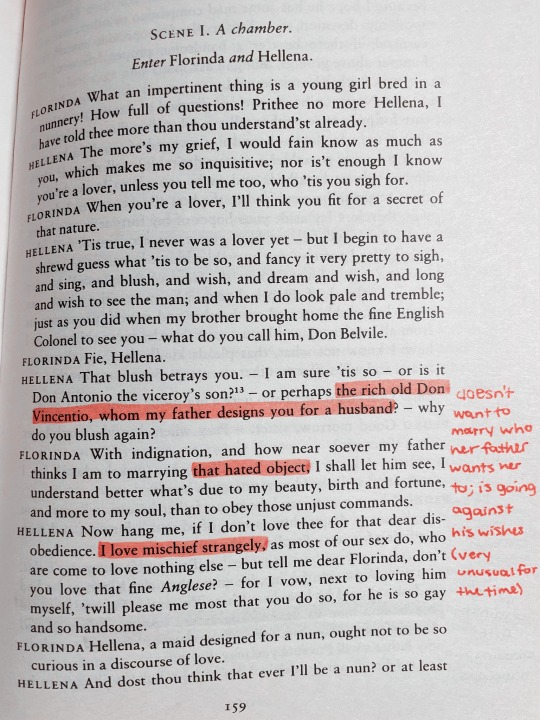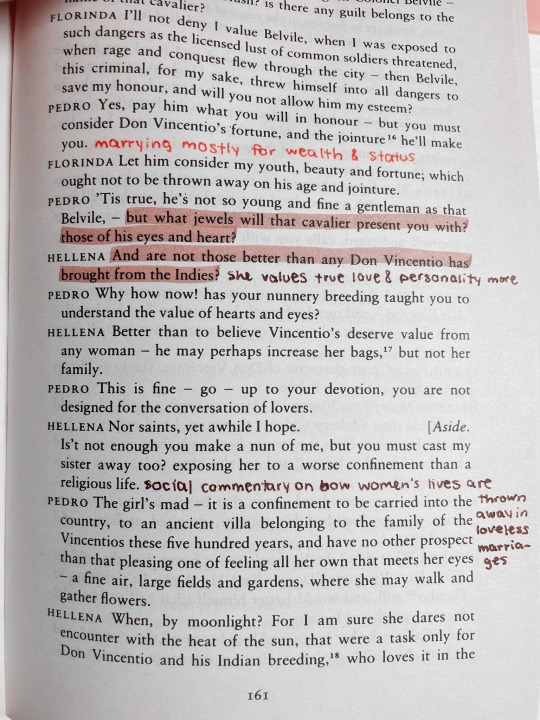#aphra behn
Explore tagged Tumblr posts
Text
“Damn these gay harlots” has been added to your vocabulary
18 notes
·
View notes
Text
I value Fame as much as if I had been born a Hero; and if you rob me of that, I can retire from the ungrateful World, and scorn its fickle Favours.
—Aphra Behn, in her preface to "The Lucky Chance"
79 notes
·
View notes
Text

Day 15: Aphra Behn!
The childhood of Aphra Behn is shrouded in mystery - much of it mystery of her own making. She was likely born to working-class parents in England; she likely spent some years living in colonial Suriname; she seems to have briefly been married to a merchant surnamed Behn. What is almost certain is that young Aphra was self-educated, lacking a classical education but becoming a ferocious and talented writer.
Aphra, born during the chaos of the English Civil War, was devoted to the restored monarchy. She willingly took up a dangerous occupation - foreign espionage. During the Second Anglo-Dutch war, she spied for England in the Netherlands, attempting to bring over double agents. But her target betrayed her, cash-strapped King Charles never paid the promised wages, and Aphra returned to England heavily in debt.
It was time to turn her writing into a career. Aphra wrote plays, rollicking Restoration comedies and tragicomedies. Many critics scorned the idea of a female playwright - particularly a somewhat raunchy female playwright- but a string of successes brought Aphra to the forefront.
If plays were her bread and butter, poetry was where she poured out her heart. Aphra wrote reflections on the female condition, love poems to both men and women, and even erotica - a topic common among the lettered libertines at court, but downright scandalous for a woman. Her greatest prose work, Oroonoko, a tragedy about the heroic leader of a doomed slave rebellion, is considered one of the first anti-slavery works in English. Aphra died in 1689; she was buried in Westminster Abbey.
#aphra behn#english history#history#queer history#awesome ladies of history#october 2024#my art#markers#slavery mention
12 notes
·
View notes
Text
if you like Shakespeare, especially Much Ado About Nothing, you haaaaave to read The Rover by Aphra Behn btw. It slays so hard.
#and dont get me started on hellena. beloved#it's really like a darker edgier much ado. you'll hate willmore but florinda slays#it is so good#shakespeare#much ado about nothing#the rover#aphra behn
26 notes
·
View notes
Text
I am once again thinking about how the Rover dwarfs all of Aphra Behn's other plays in acknowledgment and how if people read only one Behn play it's always the Rover but it personally for me was not even close to the most interesting play I'd read by her very early on and it's kind of not a light thing I wanna reread because of the two near-rape scenes
#text post#im not criticizing those scenes for existing or ppl for staging them but like. i. am uncomfortable#which i think most ppl can be kind enough to assume as opposed to making the ungenerous decision that i believe in censorship#but it's tumblr you never know!!!!#aphra behn#yeah when i got the oxford world classics edition of the rover and other plays i read the feigned courtesans first#and i still think that play is more interesting and funnier than the rover but that's just me#im not shitting on the rover at all i just personally cannot find anything in that work that behn doesn't do just as well in another#and the plot of something like courtesans or the lucky chance is kinda more intriguing to me#ive read a handful of other lesser-printed ones recently from the library#my favorite of which has to be the young king... now THAT is a neglected play#but it's also tragicomedy/romance and not her standard stuff so as an exemplar of her writing it's not a good start#still id say the other two i just named. are.
4 notes
·
View notes
Text
'All women together ought to let flowers fall upon the tomb of Aphra Behn (...) for it was she who earned them the right to speak their minds.'
- A Room of One's Own, Virginia Woolf
8 notes
·
View notes
Text

"A spirit sweet, and in Love's very guise,
Who to the soul is ever saying, Sigh!”
Ufffff!
#dante#the new life#love#love quotes#fall in love#love poem#love poetry#scrapbook#scrapbooking#journal#journaling#notebook#alfred tennyson#edgar allan poe#cristina rossetti#aphra behn#christopher marlowe#writing#handwritten#poetry
8 notes
·
View notes
Text


old photos from earlier this semester that i forgot to publish — from the rover by aphra behn.
#books#booklr#studyblr#study#studying#studying aesthetic#study aesthetic#studyspo#english major#the rover#aphra behn#captainofstudies#problematicprocrastinator#myhoneststudyblr#*mine
49 notes
·
View notes
Text
Time Travel Question 42: Assorted Other Performances II
These Questions are the result of suggestions from the previous iteration.
All time periods welcome. (Yes we have Live Aid).
Please add new suggestions below if you have them for future consideration.
I am looking for Shakespeare play premiere's you'd particularly like to see.
Shakespeare Plays Have their own poll. For purposes of this poll, Early Modern will arbitrarily be 1500-1799.
#Early Modern#Time Travel#Theater History#Music History#Passion Play#Julie D'Aubigny#Middle Ages#Mozart#The Magic Flute#Wolfgang Amadeus Mozart#15th Century#Ballet#Jacopo Peri#La Dafne#16th Century#17th Century#18th Century#The Ballet Comique de la Reine#Aphra Behn#The Forc'd Marriage#Henry VII#Vaux-le-Vicomte#Nicolas Fouquet#Louis XIV#Tudors#Miguel de Cervantes#Gregorio Allegri
32 notes
·
View notes
Text
Poem of the Day 13 August 2024
Song from Abdelazar BY Behn, Aphra (1640 - 1689)
Love in fantastic triumph sat,
Whilst bleeding hearts around him flow'd,
For whom fresh pains he did create,
And strange tyrannic power he shew'd;
From thy bright eyes he took his fire,
Which round about in sport he hurl'd;
But 'twas from mine he took desire
Enough to undo the amorous world.
From me he took his sighs and tears,
From thee his pride and cruelty;
From me his languishments and fears,
And every killing dart from thee;
Thus thou and I the God have arm'd,
And set him up a Deity;
But my poor heart alone is harm'd,
Whilst thine the victor is, and free.
3 notes
·
View notes
Text
youtube
#history#royal history#lindsay holiday#philippe I duke of orleans#queer#queer history#philippe de lorraine#henriette anna of england#louis xiv#armand de gramont#elizabeth charlotte of the palatinate#anne lennard#armand charles de la porte de la meilleraye#charles II#aphra behn#her history#henry of prussia#blainville#count la roche laymon#christian ludwig von kaphengst#frederick II#isabella of bourbon-parma#joseph II#maria christina of teschen#ludwig viktor of austria#luisa isabel alvarez de toledo#leoncio gonzalez de gregorio#liliana maria dahlmann#ivar mountbatten#mavendra singh gohil
2 notes
·
View notes
Text
The poem:
All trembling in my arms Aminta lay,
Defending of the bliss I strove to take;
Raising my rapture by her kind delay,
Her force so charming was and weak.
The soft resistance did betray the grant,
While I pressed on the heaven of my desires;
Her rising breasts with nimbler motions pant;
Her dying eyes assume new fires.
Now to the height of languishment she grows,
And still her looks new charms put on;
Now the last mystery of Love she knows,
We sigh, and kiss: I waked, and all was done.
‘Twas but a dream, yet by my heart I knew,
Which still was panting, part of it was true:
Oh how I strove the rest to have believed;
Ashamed and angry to be undeceived!
3 notes
·
View notes
Text
APHRA BEHN // PLAYWRIGHT
“She was an English playwright, poet, prose writer and translator from the Restoration era. As one of the first English women to earn her living by her writing, she broke cultural barriers and served as a literary role model for later generations of women authors. Rising from obscurity, she came to the notice of Charles II, who employed her as a spy in Antwerp. Upon her return to London, she began writing for the stage under the name Astrea.”


2 notes
·
View notes
Text
Meet Aphra Behn! She was a professional playwright and early novelist living in 17th-century England, and a real pioneer for women in these roles. She is known for her abolitionist-leaning novel Oroonoko: Or, The Royal Slave and a number of plays, one of her best-known being The Rover.
She was a fascinating woman, and I'd love to introduce you properly in the linked post!
3 notes
·
View notes
Text

Go hence to have more talk of these sad things:
Some shall be pardon'd and some punished.
For never was a story of more woe
Than this of Juliet and her Romeo.
-William Shakespeare, Romeo and Juliet

Thus died this great Man, worthy of a better Fate, and a more sublime Wit than mine to write his Praise: Yet, I hope, the Reputation of my Pen is considerable enough to make his glorious Name to survive to all Ages, with that of the brave, the beautiful and the constant Imoinda.
-Aphra Behn, Oroonko
#classic literature#star crossed lovers#book quotes#quotes#romeo and juliet#shakespeare#oroonoko#aphra behn
5 notes
·
View notes
Text
“One hour of right-down love is worth an age of dully living on.”
Aphra Behn
3 notes
·
View notes